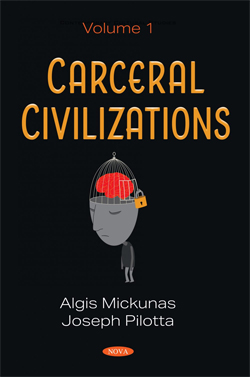Dr. Algis Mickunas, Professor Emeritus of Philosophy at Ohio University, co-edited two new volumes, Carceral Civilizations Vol. 1 and Vol. 2, published by Nova Science Publishers.
Mickunas, who has been a Foreign Member of the Lithuanian Academy of Sciences since 2008, partnered with Joseph J. Pilotta of Vilnius Gedimino University in Lithuania on the book.
Incarceration isn’t just about prisons and physical facilities, posit the authors, who probe fascist, communist and autocratic systems. They also examine colonialism, exclusion, and control over education as means of incarceration. And they finish the volumes with a look at the contemporary issues of global migration and immigration, populism and nationalism.
 Nova’s website describes the book:
Nova’s website describes the book:
The usual notion of incarceration suggests specific locations in a given society: prisons or, in gentler form, psychiatric institutions. This notion will be incorporated in the text in various and much broader contexts. We investigate civilizations and their specific cultures in terms of their compositions which may “incarcerate” a person without specific facilities: More recent and still continuous examples are Fascistic and Communist empires, or traditional autocratic and theocratic systems.
In addition, there are civilizations which, while open and democratic, might exclude various groups from participation due to education, race, or class status—and such exclusion may not be regarded as “incarceration.” One prevalent form of autocratic incarceration is the control of education and literature available to the citizens. There are other forms which subject a group, or an entire civilization, to “incarceration” due to colonialisms and their usual “monological” imposition of totalizing discourse as a criterion for what is civilized and what is not, all the way to what is human and what is not adequate to be regarded as human. The monological form also applies to totalizing discourses in modern “sciences” and technical fields, offering “explanations” of every facet of human behavior. The trend is a push for “education” only in technical fields.
It is also imperative to investigate the various contemporary trends in cultural theories which propose multi-cultural “methods” without attending to the issue of the illogical nature of such methods. Finally, we address the current debates of global migrations, immigrations, and the issues as to the status of persons caught in such movements with regard to “legal” questions. This issue is confronted by the emergence of “populisms” and “nationalisms” worldwide, and a usually avoided question, “Why there is a denouncement of the West by members of various civilizations and their cultures, and yet the demand that only the West should welcome “the others.” (Imprint: Nova)


















Comments